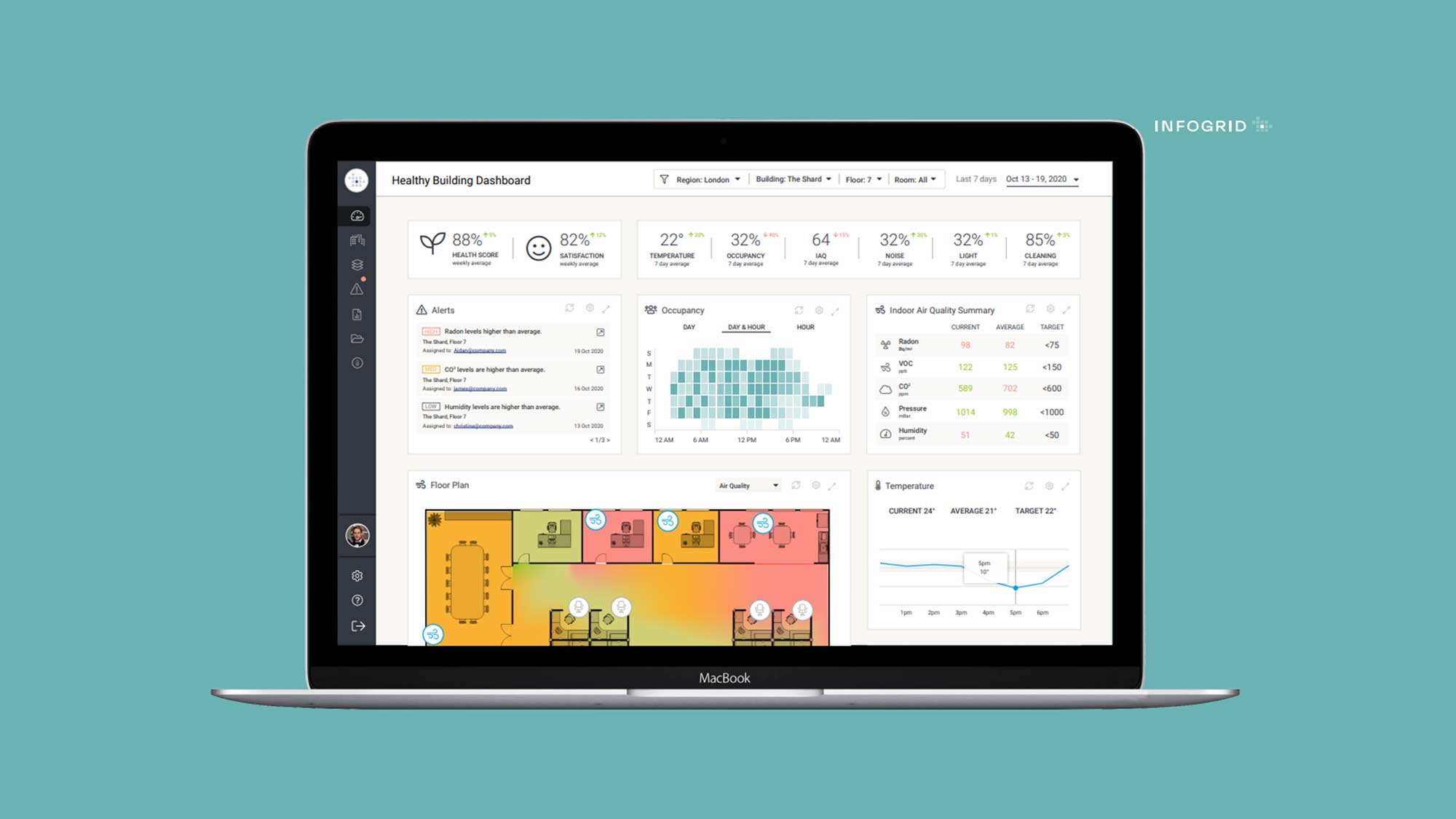Infogrid, a startup that uses AI to collect and analyze data on things like air quality, occupancy and energy consumption, today announced that it raised $90 million in a Series B round led by Northzone. William Cowell de Gruchy, Infogrid’s CEO, says that the cash will be put toward product development, strategic hires and customer acquisition efforts.
“Now was the time to raise the capital and use it to drive our expansion,” De Gruchy said. “We are coming off of 5x growth last year and the market is strongly calling for our solutions … We opted for equity because alongside capital, we want strategic partners to help us scale to the next level and we have both VCs and clients and partners investing. This brings value far greater than even the cash.”
De Gruchy — who has a fascinating history, having studied cage fighting and served as an army officer before pivoting to a quieter, white-collar career in due diligence analysis — founded Infogrid in 2018. While working for strategic advisory firm Drystone Strategy, De Gruchy routinely visited companies that he was “diligencing” for private equity deals, including dairies, roofing companies and distribution warehouses.
While on these “diligencing” visits, De Gruchy spotted what he describes as a lack of real-time digital data and visibility into “operational inefficiencies,” as well as health risks and environmental concerns surrounding buildings and facilities.
“When I asked why people weren’t using current-day technologies — e.g. cloud computing, cellular connectivity and sensors — to solve this issue, they repeatedly answered in the same way; it was too complex and too expensive,” De Gruchy told TechCrunch in an email interview. “I set out to answer that problem and defeat the incumbent solution — the clipboard — and that’s the seed that became Infogrid today.”
Infogrid’s platform, powered by AI, gathers and analyzes data from Internet of Things (IoT) sensors to help property managers and owners optimize the performance of their various buildings — at least in theory. Via IoT sensors manufactured by an ecosystem of hardware partners, Infogrid can measure domains such as the number of people, air quality and cleaning needs throughout a building, for example, as well as track energy usage and CO2 levels in relation to the number of people in a building, so that customers can make adjustments impacting sustainability scores and operating costs.

As De Gruchy explains, the types of customers adopting Infogrid are usually looking to solve facilities management issues like avoiding unnecessary cleaning, preventing pointless tap flushing for legionella compliance or environmental, social and governance reporting.
“We collect nearly 4 billion data points per month, up from 500 million a year ago, and growing exponentially,” De Gruchy said. “This trains our AI, which is then refined with user feedback, making it better.”
Infogrid competes with a number of companies in the buildings management space, including BrainBox and Sidewalklabs’ Mesa, whose algorithms make fine-grained adjustments to climate control and monitoring systems on the fly. Meanwhile, Facilio and Buildings IOT, two other rivals, install and configure building control systems and bring the data from those systems together within a unified management interface.
The growing number of competitors coincides with an uptick in VC investments in IoT companies. IoT companies raising funds in 2022 pulled in $15.9 million on average, up 30% from the previous year, as Crunchbase data reveals.
De Gruchy credits several factors with Infogrid’s success. First, he notes that an increasing number of regulations — like London banning home and office rentals below a certain energy threshold — are forcing companies to consider investing in a monitoring platform. Second, he argues that Infogrid is differentiated from other IoT-based building management systems in that it offers more context, specifically occupancy and air quality data.
“There is a major transformation underway in real estate as people reduce their footprint and are forced to take sustainability seriously,” De Gruchy said. “Both are tailwinds for Infogrid as companies that seek less, but greener, real estate flock to greener, more tech-enabled buildings. Infogrid helps our clients to provide exactly this, which improves their rental yields and asset values.”
When asked about the size of Infogrid’s customer base, De Gruchy wouldn’t give a figure, save claiming that the startup services “some of the largest commercial real estate services companies in the world.” He also wouldn’t give a ballpark with respect to revenue, and — in a potential cause for concern — wouldn’t commit to growing Infogrid’s 250-person headcount this year.
But he repeatedly assured TechCrunch that business is healthy.
“The pandemic was a strong tailwind; it drove much greater interest in remote monitoring at the time, and has driven many of the macro environmental, social and governance and real estate consolidation trends,” De Gruchy added. “This is a venn diagram ranging between point solutions for things like energy or air quality, older building management system players, software-only dashboards that scrape data from existing networks, or in-house solutions. None of these deliver everything Infogrid does, so they are only competitive in small sub areas, and many times would-be competitors are partners as we’re stronger selling a holistic solution together.”































Comment